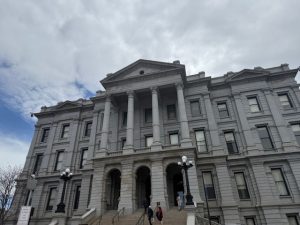Decisions due after rough campaigns

ALL |
EAGLE COUNTY ” It’s coming down to the wire for this election season.
Right now, only a few changes are guaranteed after Tuesday’s voting. Eagle County voters will replace Commissioner Tom Stone and Assessor Joyce Mack. State voters will replace Gov. Bill Owens.
Like Owens, Stone can’t run for a third term due to state law. Mack, who’s finishing her first term in office, was unseated in August’s Republican primary.
Beyond those guarantees, how the local and state landscape changes depends on voters’ opinions of a host of state ballot issues. Two of those issues ” Referendum I and Amendment 43, address different sides of the arguments about gay rights.
Another pair ” Amendment 39 and Referendum J ” offer voters two versions of one idea, that state school districts must spend at least 65 percent of their revenue in classrooms.

Support Local Journalism
Besides the extraordinarily long state ballot, county voters have a lot of decisions to make, too. In addition to the elected officials, voters will decide the fate of three local tax increase proposals.
The biggest would build a new high school and buy land for another. The local library district wants more money to expand its buildings in Avon and Eagle, and County Commissioner Arn Menconi is leading the charge for a “child services” tax.
Here’s a look at what’s on the ballot, starting with the state races.
It looks as if the Democrats will take back the governor’s office, a position the party has held for 24 of the last 32 years.
This year’s favorite is Democrat Bill Ritter, the former Denver District Attorney, who’s leading in virtually every opinion poll.
Trailing is Republican Bob Beauprez, who currently holds the seat in the state’s Seventh Congressional District. Beauprez’s run for governor has created an opening for that seat, but that’s another story.
While polls show them losing the governor’s seat, Republicans believe they have a shot at taking back the Colorado House of Representatives, which they lost in 2004. It was the first time in 40 years that Democrats held majorities in both houses of the Legislature.
That statewide power struggle has landed close to home in the form of the race between Summit County Democrat Dan Gibbs and Leadville Republican Ken Chlouber.
Chlouber, 67, has nearly 20 years of experience as both a state representative and senator. Gibbs, 30, is taking his first shot at elective office, but he’s no stranger to politics, having worked as a staff member for U.S. Congressman Mark Udall for several years.
In addition to the governor’s race, voters across the state will elect an attorney general, a new secretary of state and a new treasurer. There are also seats on the Colorado Board of Education and the University of Colorado Board of Regents up for grabs.
The state treasurer’s job can be a springboard to higher office. Both Owens and his predecessor, Roy Romer, had been elected to the treasurer’s job before winning the governorship.
At the top of the local ballot is an open seat on the Eagle County Board of Commissioners. That three-way race gives voters the choice between three Gypsum residents, Republican Tom Edwards, Democrat Sara Fisher and independent Roger Brown.
Both Edwards and Fisher come to the race with plenty of government experience.
Fisher was Eagle County Clerk and Recorder for 10 years. She was appointed to fill the job when Johnnette Phillips was elected county commissioner in 1992, then was elected twice. In her four years out of office, Fisher has worked several jobs, and is currently a consultant for a Denver-based company that helps local election officials.
Edwards, a retired architect, has been a member of the Gypsum Town Council for the past eight years. He also holds positions on several nonprofit and county volunteer boards, from the Eagle Valley Land Trust to the Eagle County Home Rule Charter Commission.
Brown, an Emmy Award-winning documentary filmmaker, lacks experience in elective office, but has spent much of his time in Eagle County trying to influence the powerful.
He talks easily about getting then-Congressman Gerald Ford to take a flight over what became the Eagles Nest Wilderness Area, fighting to keep local ranchers in business by lobbying to keep federal grazing fees down, and his efforts to preserve Western Slope water.
Fisher and Edwards have different ideas about transportation and housing: Fisher is convinced the county is ready for some sort of passenger rail system; Edwards believes proposals involving rail or expanding Interstate 70 could create more problems than they solve.
Edwards doesn’t believe building more homes with “deed restrictions” ” essentially contracts that limit future appreciation ” is the answer to the county’s housing problems. He prefers to build smaller, cheaper units near population centers and other ideas. Fisher is a believer in deed restrictions.
Both Fisher and Edwards are fluent in the language of government, which means measured responses to questions. Not so with Brown.
He’ll say flat-out that growth is “out of control” in Eagle County. Brown also has campaigned hard on issues that a county commissioner can’t have a direct effect upon.
He’d like to see the Winter Olympics come to Colorado, which he sees as the only way to get a Vail stop on a Denver-to-Salt Lake City passenger rail line. Brown worries about the impacts potential oil shale mining in Garfield and Mesa counties could have here, and believes alternative energy sources are the only way the world will survive.
The campaign has been mostly amiable between the candidates. But a postcard was mailed to voters a couple of weeks ago making possibly libelous statements about Fisher.
District Attorney Mark Hurlbert’s office is trying to determine who sent the postcards. If caught, whoever sent the cards could be prosecuted under a new law that makes it a crime to knowingly distribute false and misleading information in a political campaign.
The Eagle County Assessor’s job has been a one-term-and-out job for more than a decade. Republican incumbents would be bounced out in a primary, with the winner then running unopposed in November.
Things are a little different this year. Ed Smith, an appraiser in the assessor’s office for nearly 20 years, defeated incumbent Joyce Mack in the August primary. This year, though, Democrat Mark Chapin was waiting for the primary winner. Chapin, now a private appraiser, worked in the county assessor’s office for 14 years before resigning.
Both say they want to upgrade the technology and improve the professionalism of the office, which has seen quite a bit of staff turnover in the last four years.
Incumbent Joe Hoy, a Republican, is running for a second term against Democrat Scott Griffin.
The race has been low-key, in part because Griffin has done virtually no campaign spending aside from buying business cards and yard signs.
Four county officials ” Treasurer Karen Scheaffer, Clerk and Recorder Teak Simonton, Coroner Kara Bettis and Surveyor Dan Corcoran are running unopposed.
If the county’s home rule charter passes, Corcoran will be the last elected Eagle County Surveyor. The new charter would eliminate Corcoran’s job and replace it with a staff job in the Eagle County Engineering Department.
Referendum 1A would raise Eagle County property taxes by at least $3.5 million per year for the next 15 years. The money would pay for “child services,” including, perhaps, more pay for preschool teachers, building more facilities, and providing in-home visits to families.
Supporters point to a raft of documents that indicate money spent on “at-risk” kids while they’re in preschool can save money down the road when those kids aren’t juvenile delinquents or adult criminals.
Money from the tax would be spent by the county commissioners, but recommendations would come from a volunteer group. That’s similar to the way money from the county’s open space tax is spent now. The tax would add about $48 per year in taxes to a home valued at $400,000
Opponents complain the spending authority in the ballot language is too vague. Opponents also say money from the tax would go to the children of illegal immigrants. Backers say money won’t be spent on illegal immigrants, but the new state law tax proponents cite as evidence has a provision that forbids public agencies from asking about the immigration status of anyone younger than 18.
Backers have raised and spent vastly more money than opponents. But the opponents, a group called “Coloradans for Economic Justice” have no individual donors and are represented only by a Denver attorney. Coloradans for Economic Justice is also opposing the home rule ballot issue.
Referendum 1B asks voters to approve a new county charter that would create Colorado’s first “home rule” county since 1978. Voters last year elected a commission to draft the charter.
The new charter would increase the board of commissioners from three to five members, and would remove party politics from county elections. Although candidates could continue to call themselves “proud Democrats” or “stalwart Republicans” while campaigning, party affiliation wouldn’t appear on the ballot.
Putting two new county commissioners on the board would also guarantee a representative from the Basalt/El Jebel area, which hasnt’ sent one of its own to the county seat since the late 1970s.
Those who favor home rule say increased representation is needed in a fast-growing county, and that the part of the county in the Roaring Fork Valley deserves its own elected representative.
Opponents say the plan costs too much ” an estimated $386,000 per year for two commissioners’ salaries, benefits and support staff. They also say the change isn’t needed, and point to Douglas County, a fast-growing Front Range county of more than 200,000, which has a three-commissioner board.
The Eagle County School District is asking for a tax increase that would allow the district to take on $128 million in new debt. That would pay for a new high school and new elementary school at Edwards, fund a land purchase near Eagle for a future high school there, and pay for building and technology upgrades throughout the district.
Those who support the tax say Battle Mountain High School must be replaced, and a new elementary school is needed to handle an exploding student population. The ever-rising cost of land is the reason to buy property for a new western valley high school now, although the need for that school won’t come for at least another several years.
Opponents say the district should do more with the resources it has now. Opponents are also reluctant to give more money to a school district that rarely rises above the state average on state-mandated tests.
If passed, the tax would add about $123 per year to the taxes on a $400,000 home
The Eagle Valley Library District is asking voters two questions. Referendum 5A is a tax hike. Referendum 5B asks for authority take on as much as $15 million in new debt. That money would pay for significant additions to the existing libraries in Avon and Eagle. District officials haven’t made any promises, but say money could also be used to build a new library in Gypsum.
The Eagle library would include space for its growing history collection, including a climate-controlled room for historic documents and photographs.
In addition to building additions, the tax would pay for new computers, as well as salaries and benefits for new employees.
If passed, the owner of a $400,000 home would pay an additional $40 per year.
Seven people are running for four seats on the counci. Incumbent Mayor Ron Wolfe is seeking re-election, as is Councilmember Brian Sipes.
This race has become emotional.
Magnus Lindholm, the Swedish billionaire who’s developing the Village at Avon project ” which includes Wal-Mart and Home Depot ” has backed challengers Karri Willemssen, Dave Dantas, Rich Carroll and Pete Buckley. Buckley is the only one of the group with town council experience, but failed to win re-election two years ago.
In the past few weeks Lindholm and the current council have traded accusations about progress at the development.
Lindholm called his relationship with the current town council “frustrating and unworkable.”
Wolfe said Lindholm’s lack of support for him, Sipes and Chris Green, a member of the Avon Planning Commission, shows an “unreasonable and unbalanced point of view.”
A group called Citizens for Better Local Government has sent out postcards aimed at Sipes in particular and the current council in general. Like Coloradans for Economic Justice, Citizens for Better Local Government has no identified individual donors, and is represented by the same Denver lawyer.
Sipes sent a letter to District Attorney Mark Hurlbert asking him investigate the ads, as well as a telephone survey and a “sample ballot” sent to voters that urged people to vote for Republicans, but notably left Wolfe, a Republican, off the list.
All seven candidates volunteered to sign the letter, but Buckley later said he disagrees with Sipes’ call for an investigation.
Buckley sent a letter of his own to Hurlbert accusing Sipes of not having his facts straight or doing his homework.
Amendment 43/Referendum I
These two have received the most attention from culture warriors.
Conservative groups, most notably the Colorado Springs-based Focus on the Family, are encouraging a yes vote on Amendment 43, which would put a definition of marriage as between one man and one woman into the state constitution (state law already makes the same definition).
Conservatives are also encouraging voters to turn down Referendum I, which would allow gays to enter into “civil unions.” Those unions would allow couples to share health insurance benefits, collect Social Security and other pension benefits when one partner dies, and allow one partner to make medical decisions for the other..
Gay rights advocates have been largely quiet on Amendment 43, although they oppose it, and have focused advertising money on Referendum I, which they say is a matter of fairness to gay couples.
If both pass, the two won’t really conflict with each other, as opposed to the dueling school funding proposals.
Amendment 39/Referendum J
The courts will hash it out if both these proposals pass.
Both the amendment and the referendum require local school districts to spend at least 65 percent of their revenue in the classrooms. Analysts say the referendum, which was put on the ballot by the Colorado Legislature, allows school districts a little more wiggle room in defining whether money is spent in the “classroom.”
Backers say the measures will force local school districts to focus on classroom instruction instead of administration and other “extras.”
The state’s education establishment ” including most of the state’s school boards and teachers unions ” is fighting hard against both ballot issues. They say the ballot issues take away more control from local governments. They also say the ballot issues will create severe hardships for geographically large districts that spend a lot of money to bus students to school.
Amendments 38, 40, 41, and 42
Amendment 38 would make it easier to get referendums on state and local ballots. Backers say it’s a matter of rights. Opponents point to this fall’s stuffed ballot as a reason to vote against it.
Amendment 40 would impose 10-year term limits on all judges on the state’s Supreme Court and its court of appeals. The amendment would go into effect immediately, meaning the next governor would appoint five of the seven judges on the Supreme Court in 2009.
Amendment 41 puts new limits on gifts to elected officials, and tightens up what they can and can’t accept from lobbyists and others.
Amendment 42 would require an increase in the minimum wage to $6.85 per hour, with annual increases after that. This amendment hasn’t gotten the media attention of the gay rights and school funding proposals, but business groups are fighting the amendment, particularly because it would put the increases into the state constitution, thereby making changes difficult.
Referendum E would extend the state’s current property tax break for senior citizens to disabled veterans.
Staff Writer Scott N. Miller can be reached at 748-2930 or smiller@vaildaily.com.
Vail Daily, Vail Colorado










